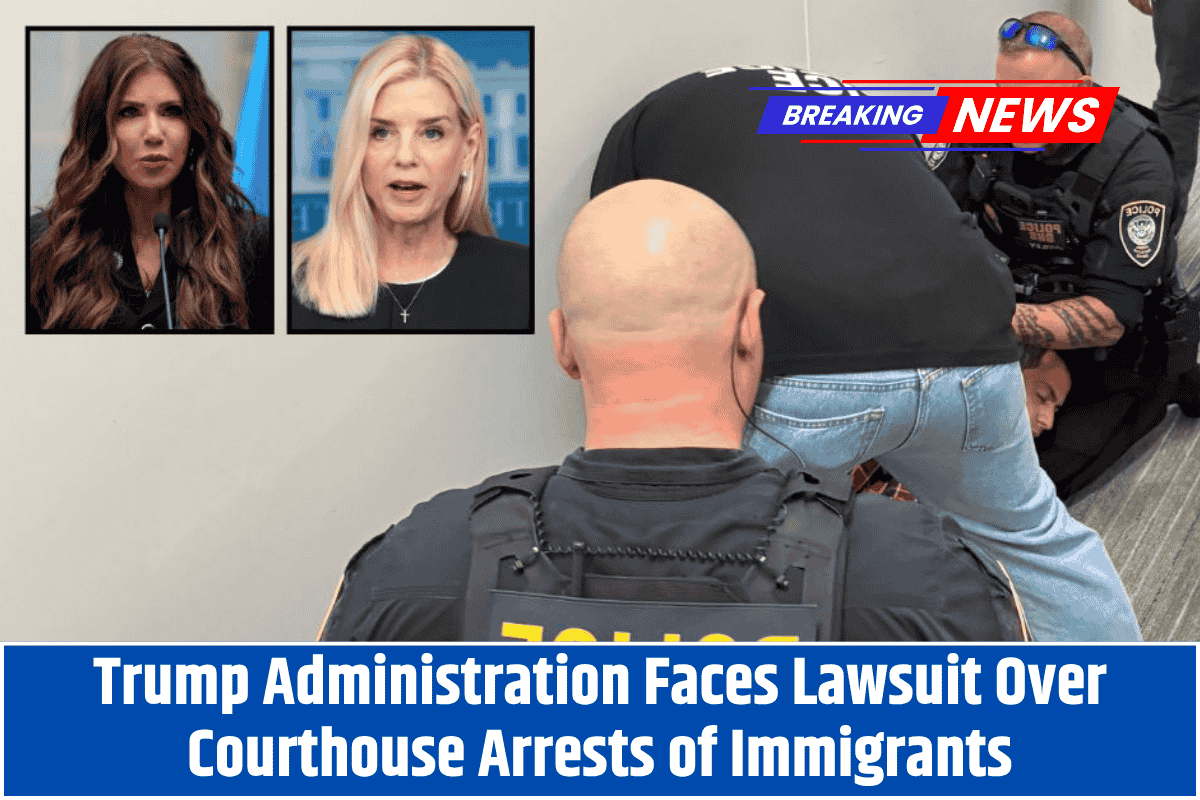A class-action lawsuit has been filed against the Trump administration over its policy allowing U.S. Immigration and Customs Enforcement (ICE) officers to arrest immigrants at courthouses.
This new practice, which the plaintiffs argue is unlawful, has sparked widespread fear and confusion among immigrants attending hearings for their legal proceedings.
Background of the Lawsuit
The lawsuit, led by the National Immigrant Justice Center (NIJC) and supported by several civil rights organizations, accuses the Trump administration of violating years of legal precedent.
Historically, courthouses were considered “sensitive areas,” where immigration enforcement was limited to ensure that individuals would not be deterred from attending court hearings. However, in the early days of the Trump administration, policies that restricted arrests in courthouses were reversed.
The plaintiffs argue that this shift in policy has resulted in immigrants, who appear in court to comply with legal requirements, being arrested by ICE agents. These arrests often lead to individuals being placed in expedited removal processes, making it harder for them to seek asylum or other immigration relief.
ICE’s Actions and the Change in Policy
According to the lawsuit, starting in May, the federal government began urging judges to dismiss civil proceedings against individuals who had “changed circumstances,” thereby allowing ICE agents to arrest them.
This new directive created a wave of arrests in courthouses, with the plaintiffs claiming that these actions were unlawful and targeted immigrants seeking legal recourse.
The civil rights groups contend that the Trump administration’s new policies are designed to undermine the rights of noncitizens under the U.S. immigration laws. The complaint highlights how these arrests have disrupted the lives of many immigrants, separating them from their families, jobs, and homes.
The lawsuit also underscores the additional difficulties these individuals face, such as limited access to legal counsel and the risk of being deported without a fair hearing.
Impact of Courthouse Arrests
The consequences of these courthouse arrests are significant. Immigrants who were arrested often face long periods of detention and may find themselves stripped of their rights to pursue legal options, such as asylum.
The lawsuit argues that by expediting removals, the Trump administration is denying individuals the opportunity to present their case before a judge.
In some instances, immigrants are taken into custody and placed in a fast-tracked deportation process, even before a judge has made a decision about their case.
This process denies immigrants the right to a full legal review and leaves them vulnerable to deportation, often to countries where they may face persecution or other dangers.
The Government’s Response
The Department of Homeland Security (DHS) has defended its actions, claiming that the new policy is a common-sense approach to immigration enforcement. Tricia McLaughlin, an assistant secretary at DHS, stated that law enforcement is justified in arresting individuals in courthouses, as it is safer for officers and the community.
She argued that courthouses are no longer sanctuaries where individuals can evade the consequences of breaking the law.
However, civil rights organizations disagree, arguing that the administration’s actions go against the principles of fairness and due process that are central to the U.S. legal system.
According to Jordan Wells, one of the plaintiff’s attorneys, the Trump administration’s policies turn immigration courts into “a trap” for immigrants, who come seeking a fair hearing but instead face detention and deportation.
Legal and Humanitarian Concerns
The lawsuit, filed in Washington, D.C., asks the court to block the government from continuing its courthouse arrests and to halt the expedited removal of those affected by these policies.
The plaintiffs argue that these actions harm not only the individuals arrested but also the broader community of immigrants who may now fear attending their immigration hearings.
As the case progresses, it remains to be seen whether the court will block the government’s actions and whether the Trump administration will alter its policies in response to the growing legal challenges.
This lawsuit sheds light on the growing tensions surrounding U.S. immigration policies and their impact on individuals seeking legal status. The outcome of this case could have significant implications for future immigration enforcement practices and the treatment of noncitizens under U.S. law.






